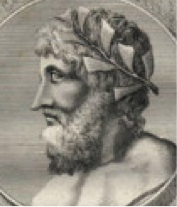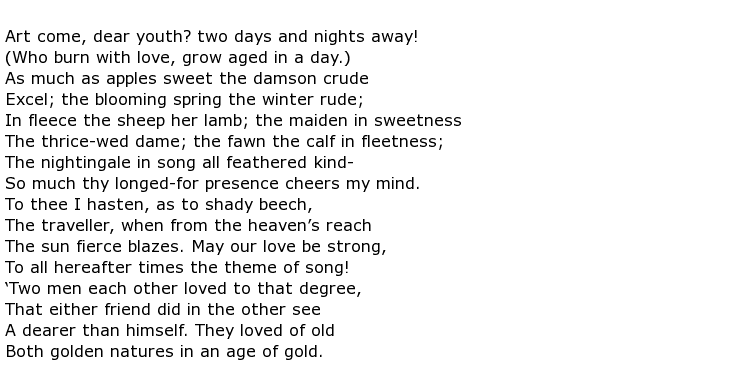 Greek literature scholars have generally considered Theocritus to be the original pastoral poet. Many others have adopted this style since but Theocritus is acknowledged as the greatest. His idylls reflected 3rdC BC life in Greece, a land of roaming flocks of sheep and the shepherds that tended them, and the fishermen who made their living in little boats. As with all other writers of this time though one has to treat with caution what one reads about him. The authenticity of certain works of poetry, attributed to Theocritus, can easily be doubted.
Greek literature scholars have generally considered Theocritus to be the original pastoral poet. Many others have adopted this style since but Theocritus is acknowledged as the greatest. His idylls reflected 3rdC BC life in Greece, a land of roaming flocks of sheep and the shepherds that tended them, and the fishermen who made their living in little boats. As with all other writers of this time though one has to treat with caution what one reads about him. The authenticity of certain works of poetry, attributed to Theocritus, can easily be doubted.
It is believed that he was born on the island of Sicily in the year 315 BC, the son of Praxagoras and Philina, though some reports put his origins as Syracuse. He moved around and there are mentions in his story of living in Egypt, Alexandria and Kos. He wrote bucolic and mime poetry, possibly in the Ancient Greek dialect known as “Doric”. The difference is that bucolic verse is sited firmly in the countryside while his mimes were generally set in a variety of towns. The bucolics are filled with lovesick shepherds and goatherds with goddesses such as Aphrodite appearing in visions to taunt or chastise the mortals below. It was a fairly common theme of verse at this time that the Gods should be challenged.
Most of his bucolic poems go by the simple titles of Idyll (with a number attached). Some are curiously laid out as so-called singing matches where the narrator takes one point of view and the “singer” offers an alternative theme. Examples of the above mentioned lack of authenticity could be found in Idylls 8 and 9. In number 9, for example, it has been suggested that lines have been added to the original verse to make the reader believe that it is true Theocritean when it may not have been so.
A good example of one of the idylls is Idyll Number XII, described as “a poem to a beautiful youth”. Here is the first verse:

It seems clear that at different points in his life Theocritus needed a wealthy sponsor so that he did not starve. An ideal opportunity presented itself when the Egyptian emperor Ptolemy Philadelphus contracted an incestuous marriage with his sister Arsinoe in the year 277 BC. Theocritus was invited to write a poem celebrating this marriage and he did so, pleasing the new Queen in the process.
Poems that were originally thought to have been written by Theocritus include such titles as Love Stealing Honey, Fishermen and Passionate Lover. While these have almost certainly come from the pen of the same author some doubt exists who the true originator was. Such are the difficulties faced by literature scholars of ancient Greek or Roman poets. The same would apply to a number of epigrams and mimes which come from the same period.
There is no doubt though that the work of Theocritus has stood the test of time and can be held up as some of the greatest pastoral verse written at any time in history.
It is believed that Theocritus died in the year 260 BC, aged 55.

